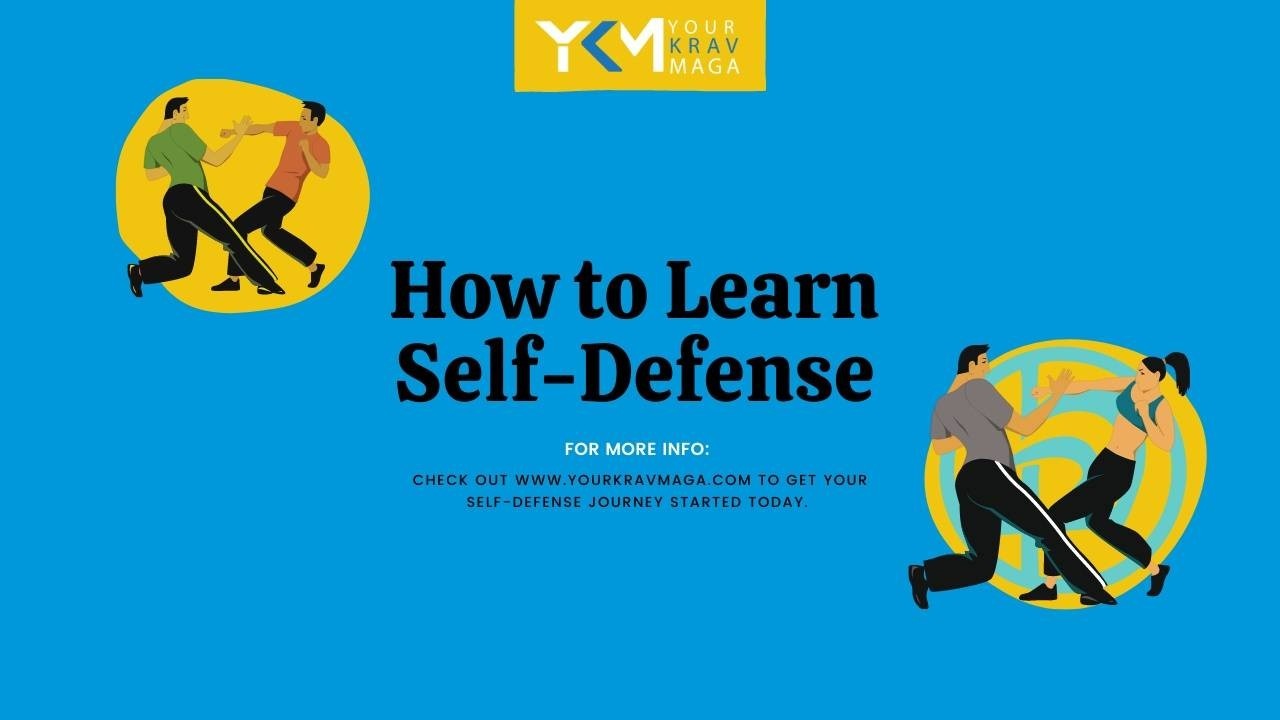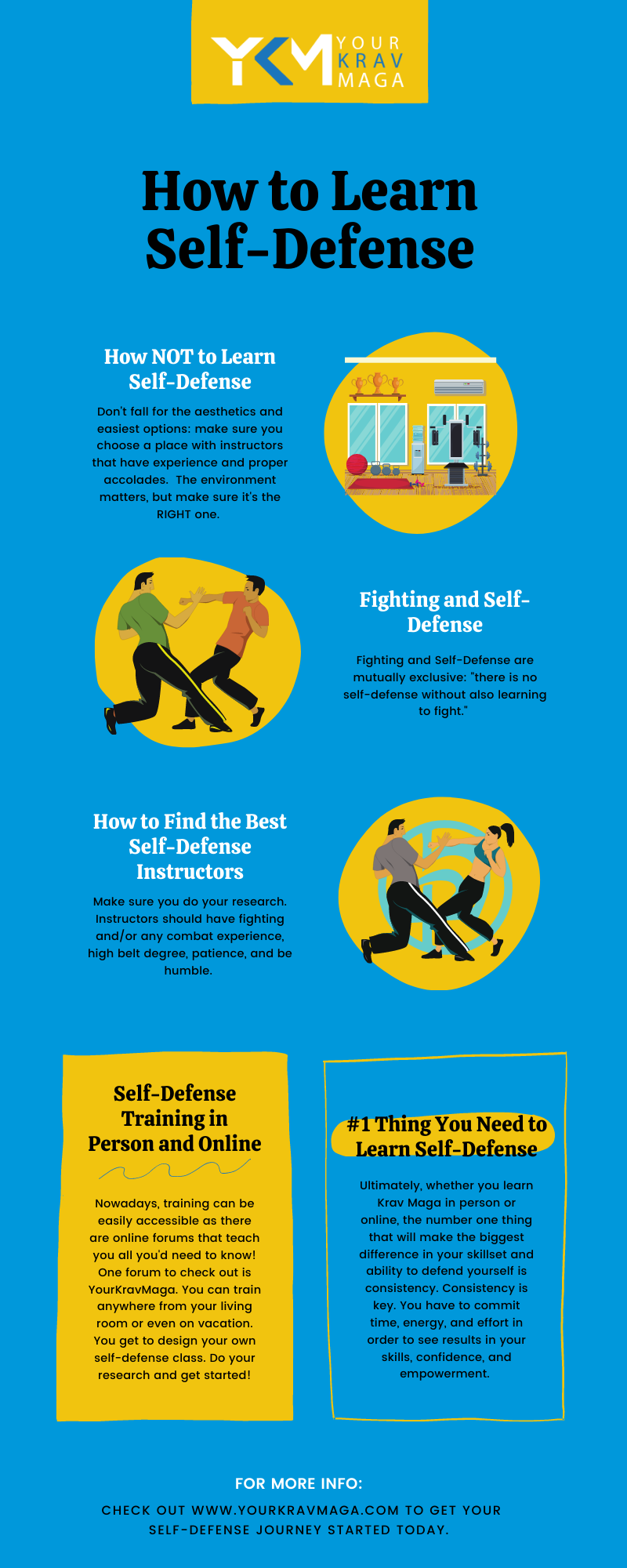How to Learn Self Defense

How to Learn Self Defense
Out of everything I get asked about martial arts, I think, “How do you learn self defense,” and “How do you learn to fight,” are the two most common things people ask. To anyone looking to learn how to defend themselves, I want to first say, congratulations on the first step. Krav Maga can sometimes feel intimidating especially if you’re a survivor of any sort of violence. Even if you’ve never been accosted but want to take the necessary precautions to get safer, Krav Maga can seem overwhelming. You have the technical combatives of punching, kicking, knees, and elbows, then there are the aggression drills, fatigue drills, defensive tactics, and stress drills which will all test your mindset and may cause you to go into fight or flight mode, and finally there’s the potential emotional catharsis that comes with the mental hurdles you overcome each time you train. Deciding to learn how to defend yourself is a big step and should not be taken lightly!

How Not to Learn Self Defense
Unfortunately, most people who are interested in learning how to defend themselves end up Googling, “How to learn self-defense” and just click the first thing that pops up.
For those who go the “extra step,” they might read a few of the online reviews and look for things such as, “Clean, friendly instructors and great customer service!” Some might even go as far as looking at two different places’ websites and then picking the one with the nicest pictures.
None of which will tell you anything about the knowledge, experience and skill sets of the instructor(s) who is going to teach you these life saving skills, if ever actually needed.
Although those are really important things to look for as well as far as the environment goes, it tells you absolutely nothing about the instructor’s knowledge and experience when it comes to actual self defense. This is a common dilemma for other martial arts like Brazilian Jiu Jitsu, Kickboxing, Boxing, etc. as well but this natural human shortcut can potentially cost you life if you’re taught by an instructor who’s subpar, a beginner, or hasn’t continued his or her self-defense and fighting training. Since Brazilian Jiu Jitsu, Kickboxing, and Boxing are sports, you can typically judge from someone’s accolades if they are credible or not.
That is not possible to do with self defense per se so instead, you often have to take your instructor’s word for it. Or worse yet, the internet’s word for it. In my opinion, that is not a great way to entrust someone with such an important skill set as self defense really is. If you are going to take the time to learn realistic street self defense and how to fight back, you want to make sure that what you learn is truly useful in a real life situation and who the person who is providing it is.
Fighting and Self Defense
Often, I use self defense and learning to fight interchangeably and sometimes an individual will respond with, “Oh, I’m not looking to learn how to fight, I just want to learn how to defend myself.” This is even more common when it comes to women’s self defense classes. What you have to remember is that Krav Maga was developed in a hostile environment and its only purpose is to be effective no matter the size of the opponent. Somewhere down the line, this core principle of Krav Maga was watered down. Many times new students have a common fear of aggression.
Here’s the problem: there is no self defense without also learning to fight. A true self defense situation can only be escaped with some basic fighting knowledge, which is as important as the self defense portion in itself! Thus, we have to understand that we also need to train our mindset to be willing to strike and fight back!
Women or parents of girls will google something along the lines of “women’s self defense classes near me.” Often when attending such a class, seminar or workshop, the participants have no idea what style of martial arts or self defense system was even taught. In many cases, it was a local Tae Kwon Do school hosting the self defense seminar, which included how to get out of wrist releases and board breaking, which is as conducive to self defense as is playing tennis. With all respect to Tae Kwon Do, which has some of the world’s best martial artists, it’s simply not a style that works well for self defense. My point is; if real self defense is what you’re looking for, make sure it is actual self defense that you’re learning. I just want to clarify that any and all real combat sports where you learn how to actually fight, such as boxing, kickboxing, Muay Thai, BJJ and MMA will obviously also give you a great benefit in a real life scenario.
How to Find the Best Self Defense Instructors
We’ve covered the challenges people face when finding credible and legitimate Krav Maga and Self Defense instructors and schools, so how do you know if your potential instructor is knowledgeable and skilled in self-defense?

Since Krav Maga is not a sport, it is a little more complicated than looking at accolades or medals won. Krav Maga will never be a sport because sports have rules. When there are rules, there are limits and in a self-defense situation, you cannot limit yourself. You have to get out as safely and as quickly as possible.
When looking for schools or instructors whether in your area or online, you want to research the following:
- Who were the teachers and mentors of this instructor? Did they get taught by Joe Shmoe down the street in the basement or were they given their belts by a legitimate Krav Maga organization? How close is that organization to Imi Lichtenfeld (founder and creator of Krav Maga)?
- What belt is the instructor in Krav Maga? There are seven belts in Krav Maga; white, yellow, orange, green, blue, brown and black. Then there are degrees of black belts. If there’s an instructor teaching self defense but he’s only a green belt himself and he’s not actively pursuing higher level training under another mentor or instructor, that’s a red flag.
- Does the self defense instructor have any military or law enforcement training or experience?
- Does the self defense instructor have any fight experience?
- Are they humble and patient in explaining techniques and do they know the nuances of why specific defensive and combative tactics are done the way they’re done or do they get defensive and short? This is more of a soft prerequisite for instructors because it’s much more subjective but still important to note. If your instructor, is unable or unwilling to explain the nuanced details of WHY you’re doing a technique a specific way, or why it’s superior to another, it’s a sign of not being confident of the craft or not having enough experience to have a deep understanding of the self defense techniques in real life.
Self Defense Training in Person and Online
Traditionally, the way we would learn self defense would be to look up the local martial arts and self defense academies and go there two to three times a week and take a certain amount of classes for a certain amount of time for each belt.
What’s so amazing about the world today is that you don’t even need to have an actual self defense or martial arts center in your area because of the internet. For example, www.YourKravMaga.com allows you to start training directly from your living room! You can train when you want and you can do it from anywhere, even when you’re traveling. Better yet, you can really focus on what you need to work on, since you don’t have to follow along with the lesson plan created by the instructor for the day. You get to design your own self defense class!
You can also learn many other fighting styles from online courses the same way, such as Muay Thai, BJJ and boxing. Just be sure to research the instructor’s credibility. For YourKravMaga, it is definitely better to have a real training partner but you can train on your own too. However, wouldn’t it be great if your friends and family could learn along with you too? All you need to get going for the online self defense training is a room, some pads and a partner!
#1 Thing You Need to Learn Self-Defense
Ultimately, whether you learn Krav Maga in person or online, the number one thing that will make the biggest difference in your skillset and ability to defend yourself is consistency. I cannot stress enough how important consistency and repetition is. You can not, cannot, learn anything from just watching or reading. You have to actually do the movements in order to create the neurological pathways in your brain, so that the desired response to an actual attack happens. This is why one day self-defense seminars are not effective. I love doing self-defense seminars because it’s a fantastic way to engage students who are on the fence. There’s a low level of commitment from the attendee so even if they’re intimidated, they are likely to participate and then it’s my job to show them the value and empowerment of Krav Maga but the reality is, you will not learn how to defend yourself in a one hour seminar. It’s unreasonable for anyone to walk out of a self defense workshop or seminar thinking they have the skills to defend themselves even in one or two scenarios. I’ve spent the better part of my life learning these skills and I’m still constantly learning and improving upon what I know. I don’t expect any of my students to have the same intense passion for Krav Maga and martial arts as I do, but if there’s anything I can impress upon you it’s that, you HAVE TO commit time, energy, and effort into learning how to defend yourself if you actually want to learn how to defend yourself. Your skills, confidence, empowerment, and results will be in direct proportion to your training consistency.
Another way not to learn self defense is through Tik Tok and instagram videos. Unfortunately, there’s a ton of frauds on social media platforms who post beautiful videos of flashy and cool techniques that are guaranteed to get you hurt badly or worse yet, killed. Once you have started your training and you can differentiate between the true experts on self defense and fighting, gaining additional information through social media platforms is great but it is important to be able to know what you’re looking for.
However, even equipped with this information, nothing will change until you take that initial step, so get started by deciding how you are going to learn self defense: in person or online or a hybrid form, including both. Do your research and then: Get started!

Stay connected with news and updates!
Join our mailing list to receive the latest news, updates, webinars, and promotions.


